2024 Mazda CX-90 First Drive Review: A family SUV for the discerning driver

Mazda’s biggest vehicle is finally here, the 2024 CX-90. And it’s big for more reasons than just its physical size. It’s the first opportunity for us to experience the brand’s new rear-drive-biased architecture. And its all-new turbocharged inline-six engine. And its first plug-in hybrid. It’s packed with all kinds of things that make us excited, and they’re all components that will become key to future Mazda products. That means all those new bits need to work well together. Further, considering how competitive this segment is, there’s even more pressure on Mazda for the CX-90 to be good. Fortunately for Mazda, the CX-90 is superb to drive with available interiors that put it on par with some real upscale brands. It’s not perfect, but it’s very good, and it’s a good sign for future Mazdas.
The most important and exciting aspects of the CX-90 are the bits underneath the skin. Unlike the CX-9 it replaces, the CX-90 runs its engines length-wise (or longitudinally) rather than sideways (transversely), and the all-wheel-drive system mainly sends power to the rear, rather than the front.
Those engines are very different, too. First off, there’s more than just the one engine option, and all of them are more powerful than the CX-9’s turbo-four. The base engine for the CX-90 Turbo is a turbocharged 3.3-liter double-overhead-cam inline-six that makes 280 horsepower and 332 pound-feet of torque. There’s a CX-90 Turbo S that has a high-output version of the engine making 340 hp and 369 lb-ft of torque. That’s on 93 octane. It will also run on regular fuel but with a dip to 319 hp. Both engines feature a 48-volt electric motor placed between the engine and transmission that provides hybrid assist. It’s more efficient than the old, less-powerful turbo four, too. The base model gets 24 mpg in the city, 28 on the highway and 25 combined. The high-output model is basically the same except for getting 23 mpg in the city. Both engines are also available with a towing package that allows the CX-90 to pull as much as 5,000 pounds. Without it, it can pull 3,500 pounds.
Sort of in-between the six-cylinder engines is the plug-in hybrid. This uses a version of Mazda’s tried-and-true naturally aspirated 2.5-liter four-cylinder that you’ll find in basically everything it sells in America. It’s paired with an electric motor that fits in the same place between the engine and transmission as other hybrids, but it’s much larger and more powerful. The electric motor on its own makes 173 hp and 199 lb-ft of torque. When combined with the gas engine’s 189 hp and 192 lb-ft of torque, you get a maximum output of 323 hp and 369 lb-ft. That’s nearly identical to the top-level six-cylinder. And being a plug-in hybrid, it can use its 17.8 kilowatt-hour battery to drive an estimated 26 miles on electricity. Overall fuel economy numbers haven’t been announced yet, though. No towing package is available with the PHEV, so capacity is limited to 3,500 pounds.
We only had the opportunity to try out the top-spec six-cylinder and the plug-in hybrid, and both impressed. The six is just as smooth as you’d hope, and it has a deep, gargling growl. But it does so with an indoor voice, so as not to disturb occupants. Mid-range power and torque are copious and with the quick-spooling turbo, you don’t have to wait long to get it. It’s a bit of a shame that it runs out of revs so quickly – redline is 6,500 rpm – because it’s a fun engine. But since power starts tapering off at the high end, it’s not like there was much more to get from spinning it higher. The 48-volt hybrid assist is more than just a slightly smoother start-stop system, too. Similar to various German luxury cars, it can completely shut off the engine when coasting, instead of waiting to come to a complete stop. Unlike Mercedes’ system, for instance, little pulses can be felt when the CX-90’s engine reengages, so a little more fine tuning could be in order there. The restarts from a complete stop could also be smoothed out. But on the whole, the six is sweet.
As good as the six is, the PHEV shouldn’t be overlooked, and in some cases is actually an improvement over the six. Obviously it will be more efficient, but the transitions between switching the engine on and off are much smoother. And with more electric grunt and no turbocharger, throttle response feels sharper. You get a bunch more torque down low, which is nice for punting around town. The four-cylinder is also happy to rev like the six cylinder. It’s a bit buzzier, but not by a large margin, and volume is still low. And with both engine and motor working together, it feels every bit as quick as the six cylinder. The PHEV does feel a bit slow in EV mode — after all, it’s working with about half the horsepower. But it’ll still keep up with traffic and get up on-ramps at an acceptable if not exhilarating rate.
It would also be nice if there was just a bit more range. The Volvo XC90 Recharge has extended its electric range to 35 miles, and the Kia Sorento PHEV gets 32 miles. The Jeep Grand Cherokee 4xe matches the Mazda at 26 miles, though it’s just a two-row.
All powertrains get the same transmission and driveline. The transmission is an eight-speed automatic that was completely engineered in-house by Mazda, a requirement to get it as small and light as possible for packaging. Instead of using a torque converter, the new transmission has a wet clutch that allows for the relatively compact dimensions of an automatic with its planetary gearsets, along with the direct connection and efficiencies of a clutched transmission (such as a dual-clutch automatic).
This transmission is a solid one. Shifts are very smooth across the board, including in Sport mode. It picks gears well, opting for low rpm and efficiency for the most part in Normal mode, and holding revs and downshifting earlier in sport mode. It also rarely has to make multiple up- or downshifts consecutively to find the right gear, but it’s not particularly quick. Particularly when matting the throttle down to the kick-down detent, it takes a moment for everything to respond to the request. There’s a manual mode that can be set to stay on when engaged, and once you adjust to the slight delay in shifts, it’s fun to pick gears yourself.
The new powertrain also made it possible for Mazda to implement some chassis upgrades. With more space on either side of the engine, Mazda was able to use a double-wishbone design, generally considered one of the best possible front suspension setups, instead of MacPherson struts. The rear retains a multilink design. The added room up front also allows for additional steering lock, so the CX-90’s turning circle is actually tighter than the CX-9, despite having a longer wheelbase.
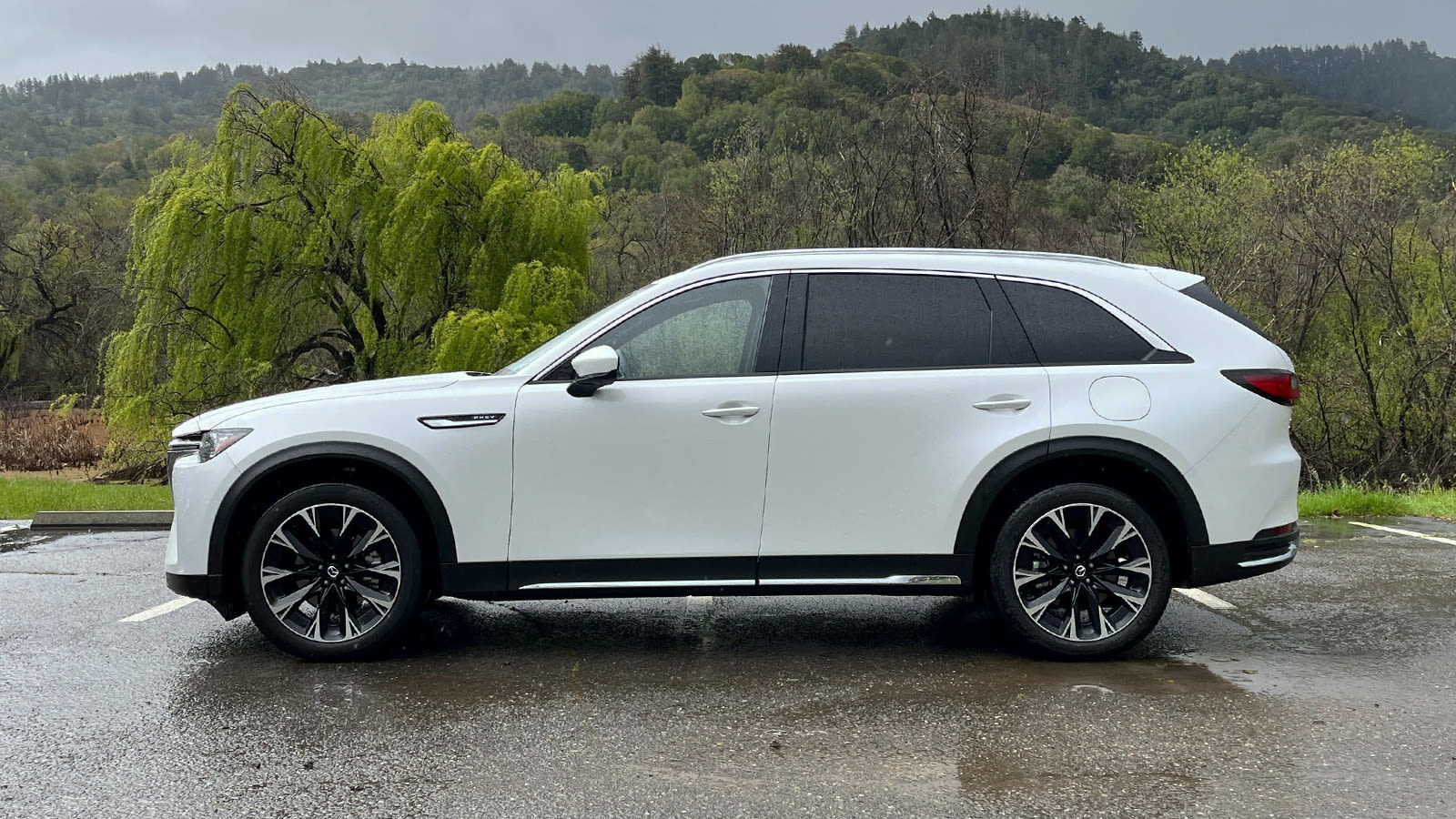
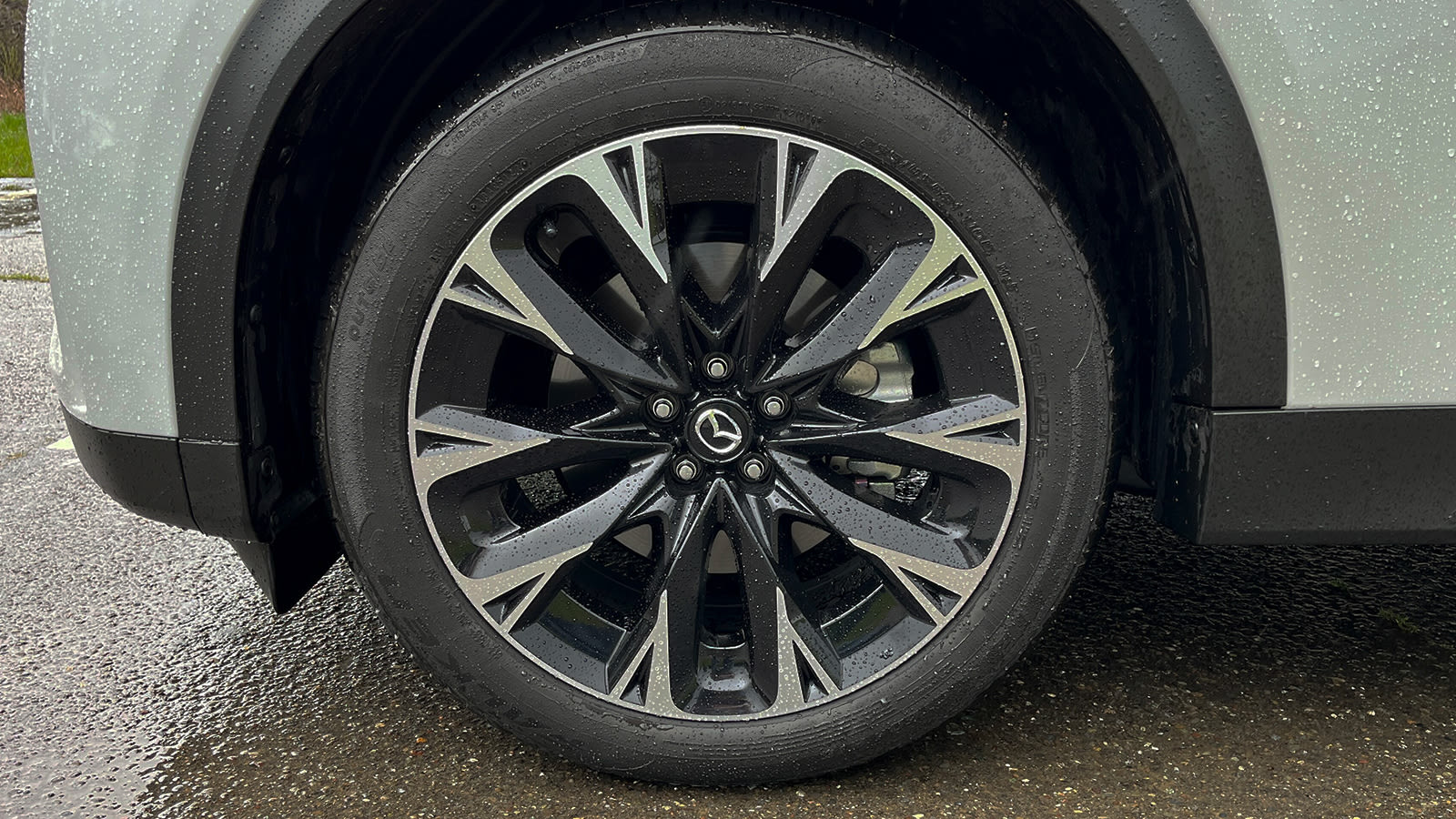
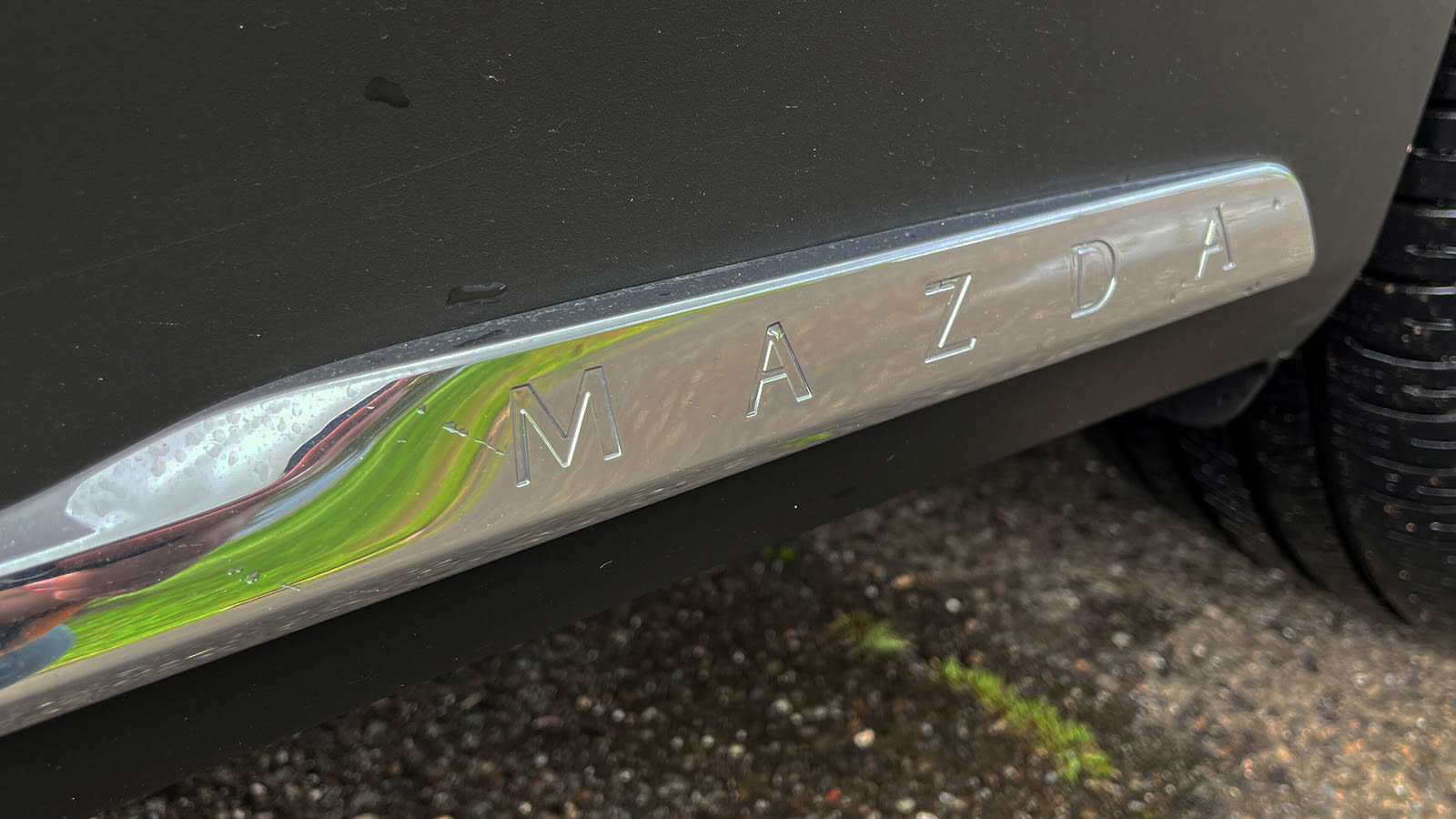
As we’ve come to expect from Mazda, the CX-90 steers and turns superbly. There’s only one suspension and steering calibration, regardless of the drive mode you’re in. Mazda’s engineers believe that a good calibration is good no matter the situation, and it’s beneficial to have a car that reacts predictably and consistently. We can see some advantages to having more customizable settings in some vehicles and situations, but the CX-90 is tuned darn well. Turn the slender steering wheel, and you’ll find that it’s smooth, precise and very sensitive. It’s easy to dial in just-right inputs at every corner. It’s fairly light and weights up very naturally and progressively, though we’d prefer a bit more feedback.
The chassis is remarkably composed, too. It’s solid and the ride is a tad firm, but the control is great. It stays stable and steady, even in corners, with very limited body roll. This makes it comfortable and confidence inspiring. On a twisty backroad, you’ll find you can keep driving it harder and harder, and the CX-90 is happy to do it. That rear-drive-biased design also means you can lay on the throttle sooner and more aggressively. It’s not what you’d expect from a three-row SUV, leaving us to ponder how good something shorter and lower on this platform could be. All this applies to both powertrains, too. The suspension has been tuned to keep the two as close as possible, and the PHEV’s extra 300+ pounds wasn’t particularly noticeable.
And that brings us to the CX-90’s shape. The wheelbase is 7.5 inches longer than the CX-9, though it only has 1.4 inches additional length in total. It’s also only about an inch wider and taller. So perhaps it’s not that surprising that interior space hasn’t changed much. There’s improvements of about an inch here or there as far as headroom and legroom, but nothing game-changing. The front occupants have plenty of room length and height wise, but knee and hip room are a little tight compared with some of the competition such as the Kia Telluride, Jeep Grand Cherokee and Acura MDX, among others. The second-row is similarly roomy, and it’s available as a three-person bench, or a pair of captain’s chairs with either a pass-through or a center console. The third row is a bit disappointing. Adults can fit, but they’ll need to find some compromise with the second-row passengers to have a tolerable amount of legroom. As is typical for rear-drive-based three-row vehicles, the seats are close to the floor, putting knees in the air, and headroom is tight. The wheel wells intrude, too, pushing the outboard passengers toward the middle. It’s available as a three-place bench or a “more contoured” two-place bench, though only two people can really fit regardless of configuration.
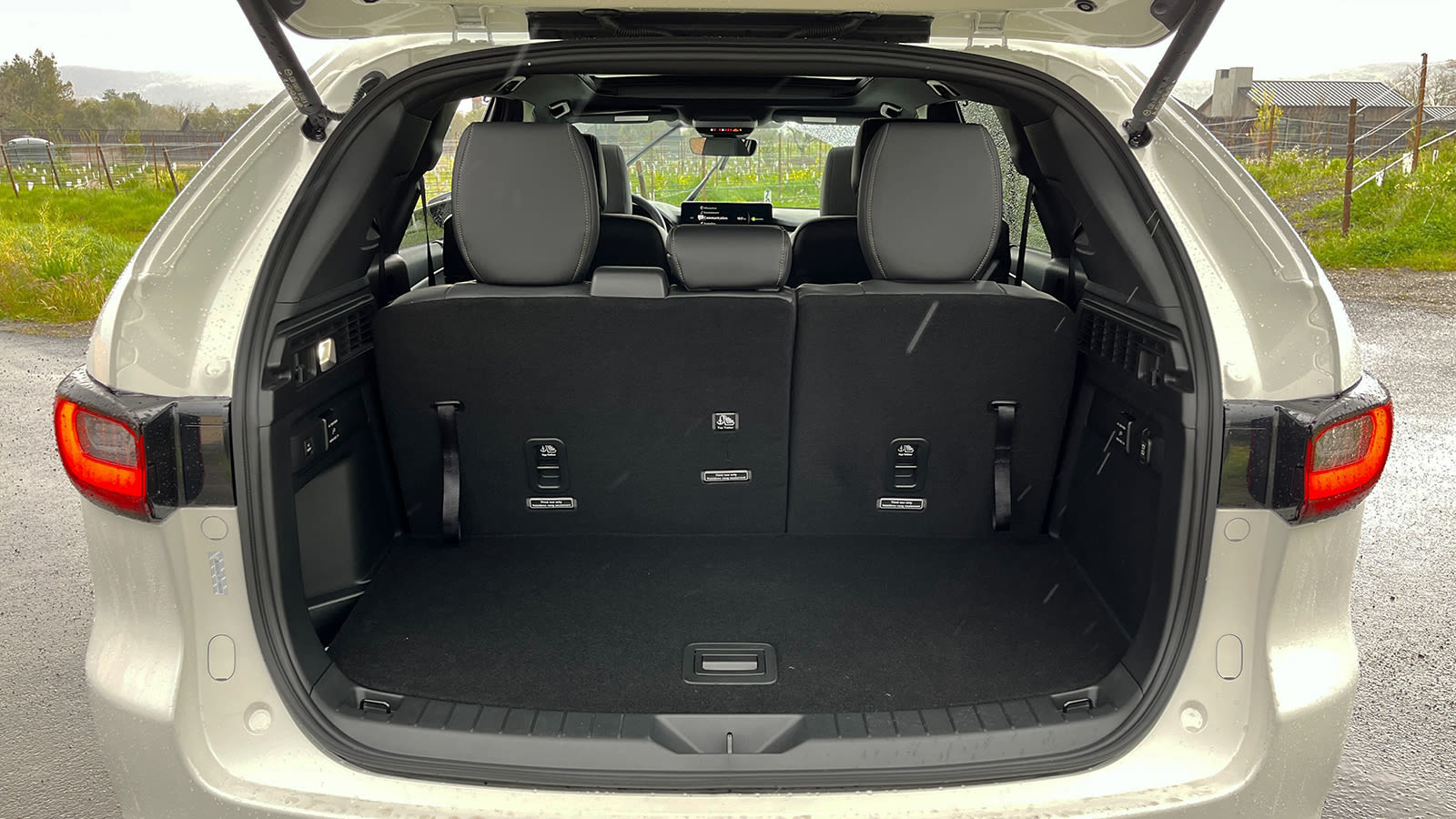
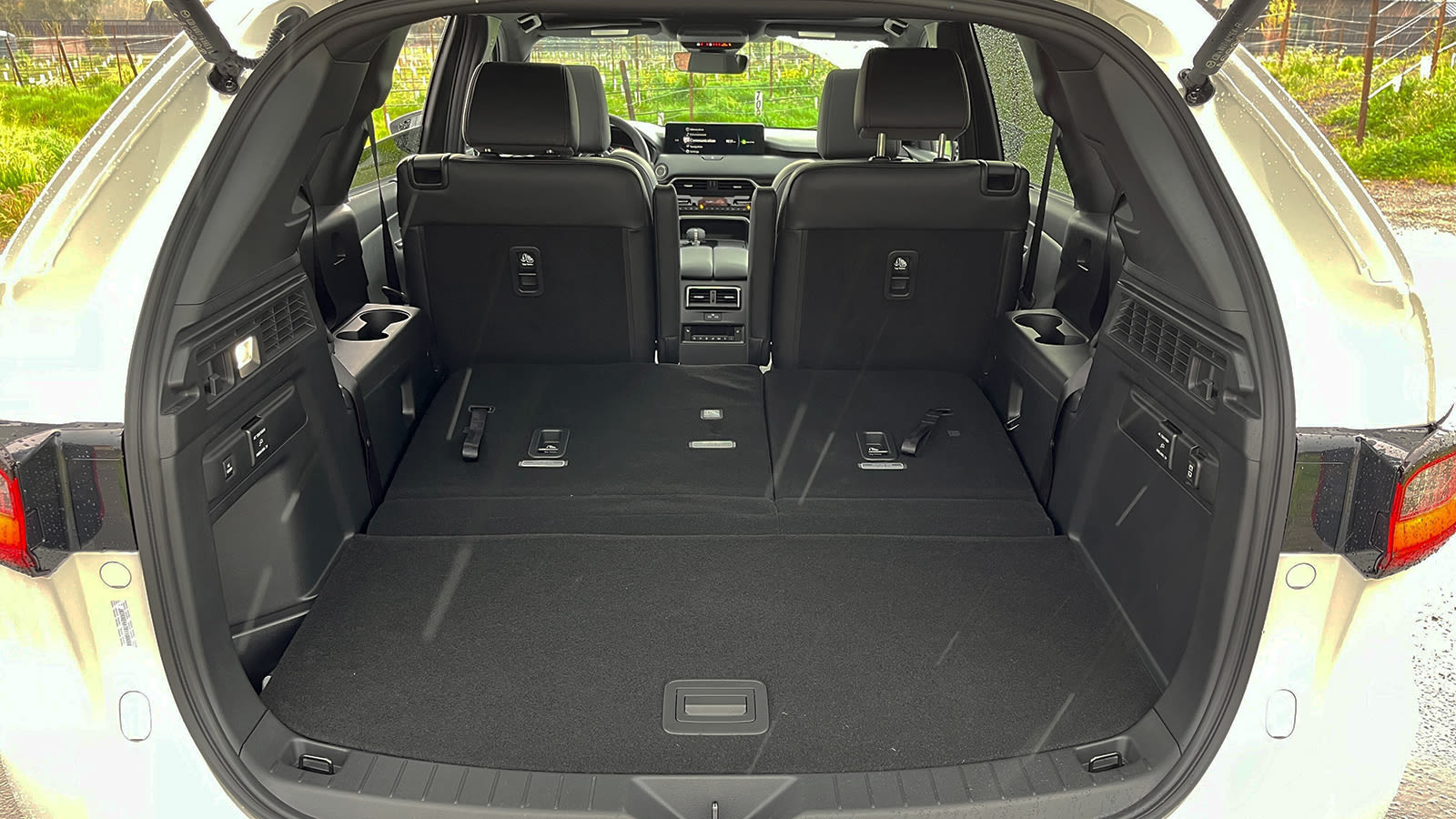
As for cargo space, it’s only improved by a cubic foot or two across the board of what was one of the least spacious in the segment, especially behind the third row. With the base three-place third-row, there’s 14.9 cubic feet behind that row. With the third row folded, space grows to 40 cubic feet, or 74.2 with the second row folded. Compared to other three-row PHEVs, the Mazda’s close to the Sorento in space and a fair bit smaller than the Volvo XC90.
While it may not be large, the Mazda’s interior is mighty classy and makes a strong case for the company’s premium aspirations, at least in the relatively high trim levels we had access to. Leather is standard on all but the base Turbo Select trim, with nicer Nappa leather options on higher trims. Those seats have pretty great lumbar support and adequate bolstering, though the seat bases are a bit short for long-legged passengers. The low, wide dash has nice main panels that are upholstered and stitched. Areas that you won’t be interacting with as directly are covered in soft-touch plastics. The top-rung Turbo S Premium Plus is genuinely on par with luxury models with sumptuous faux suede trims and, depending on color scheme, quilted seating surfaces or unique hanging-stitch dash panels and real wood trim. On the middle and lower trims, there are more plastics that have nice, finely printed patterns, but they do feel a little cheaper. The cabin is also quiet with the exception of some road noise.
Our high-trim testers also had the largest available screens for instruments and infotainment at 12.3 inches apiece, and they featured a head-up display (HUD). Lower trim CX-90s get some analog dials and a 10.25-inch infotainment display. The graphics are attractive and easy to read on both screens, and the HUD is simple and clear. There isn’t much in the way of configuring the instrument display, another aspect of Mazda trying to maintain some consistency, though it would be nice to make some adjustments, like displaying the navigation map on the instrument cluster. Mazda’s control knob returns, and it works pretty well for the native infotainment menus and functions, but is less useful for Apple CarPlay and Android Auto. Thankfully, like the CX-50, those exclusively unlock touchscreen functionality for the infotainment display. We sincerely appreciate the physical controls for climate control and radio, though, and the buttons all feel high quality and satisfying to press and turn.
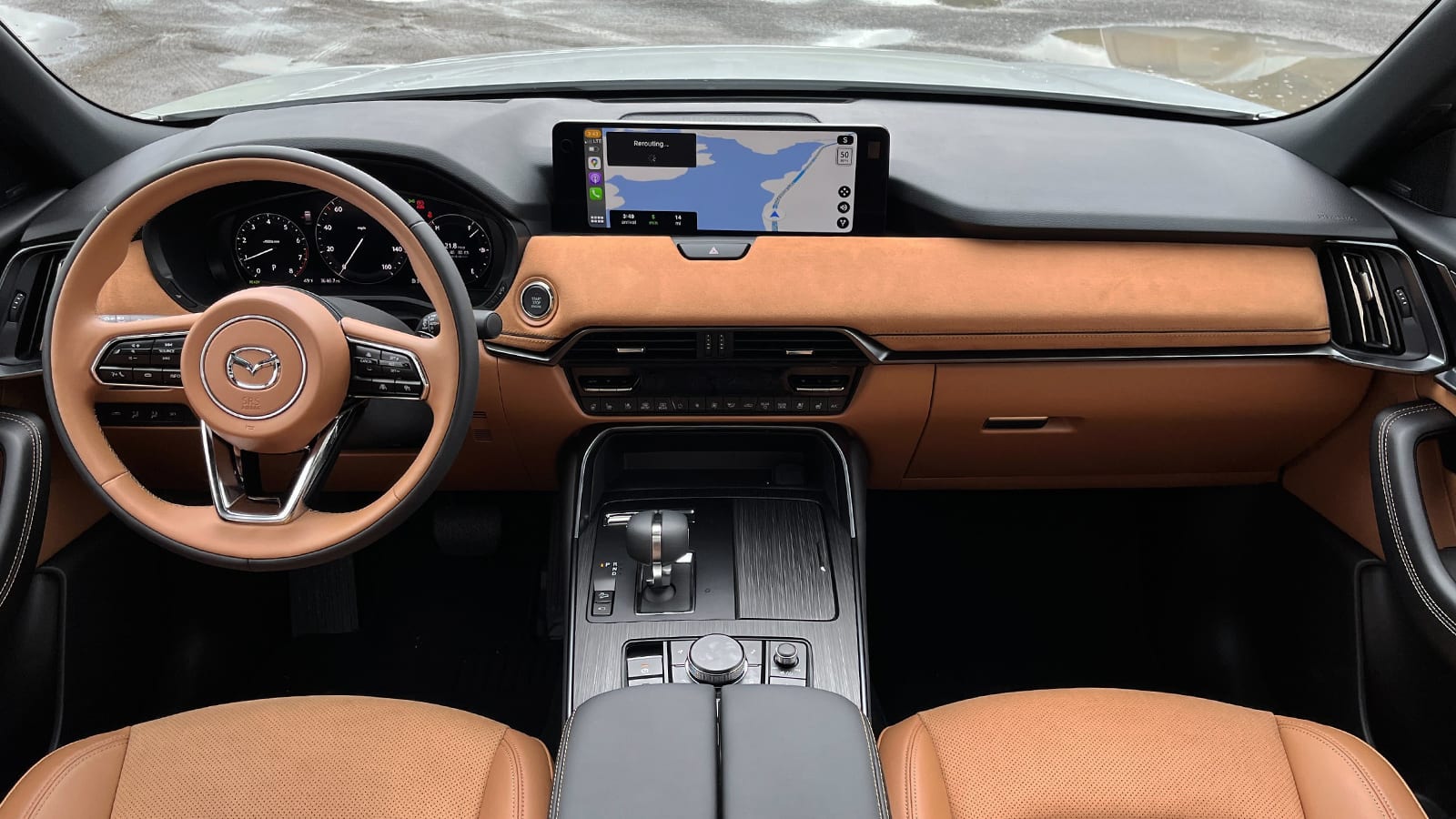
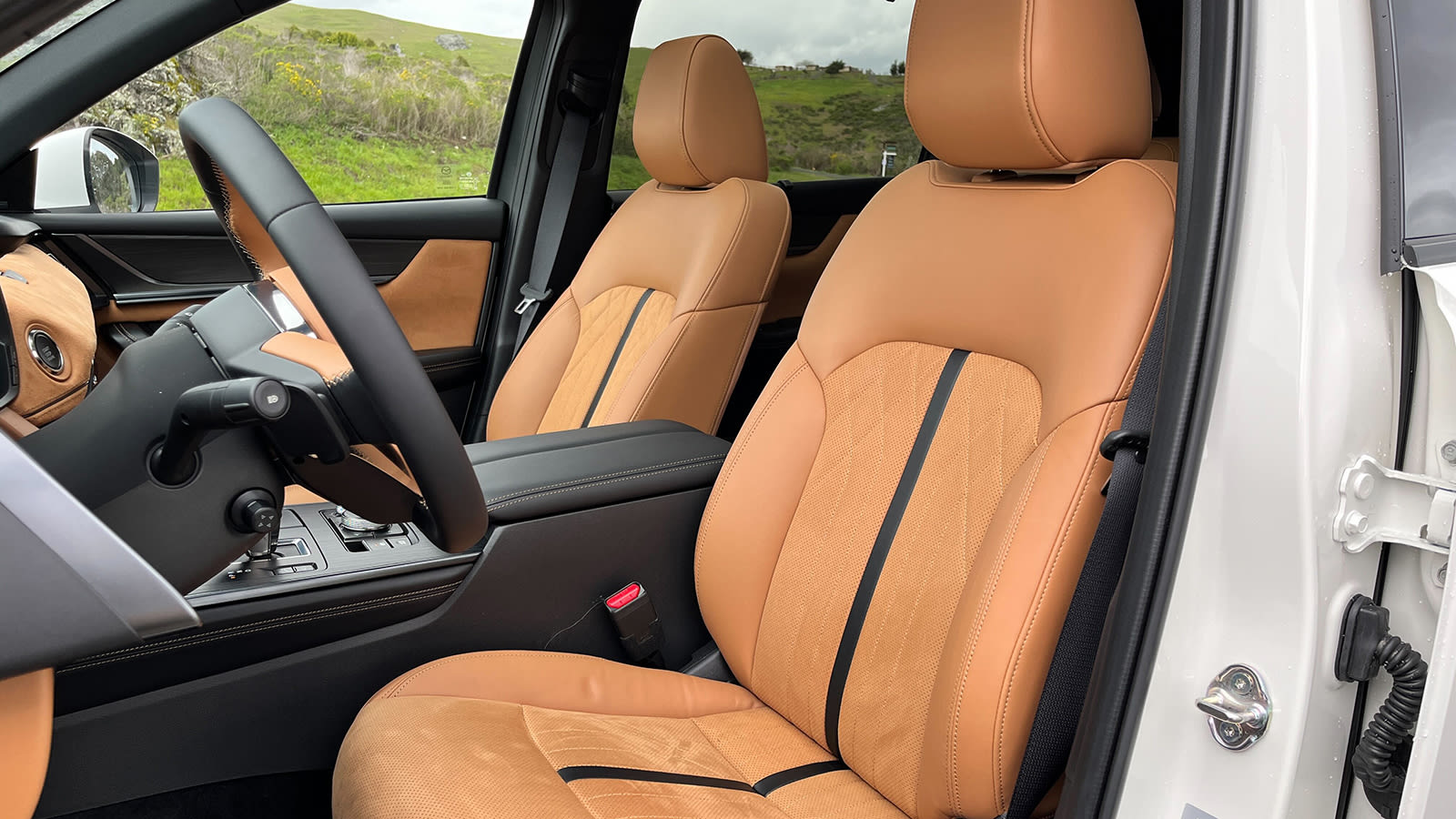
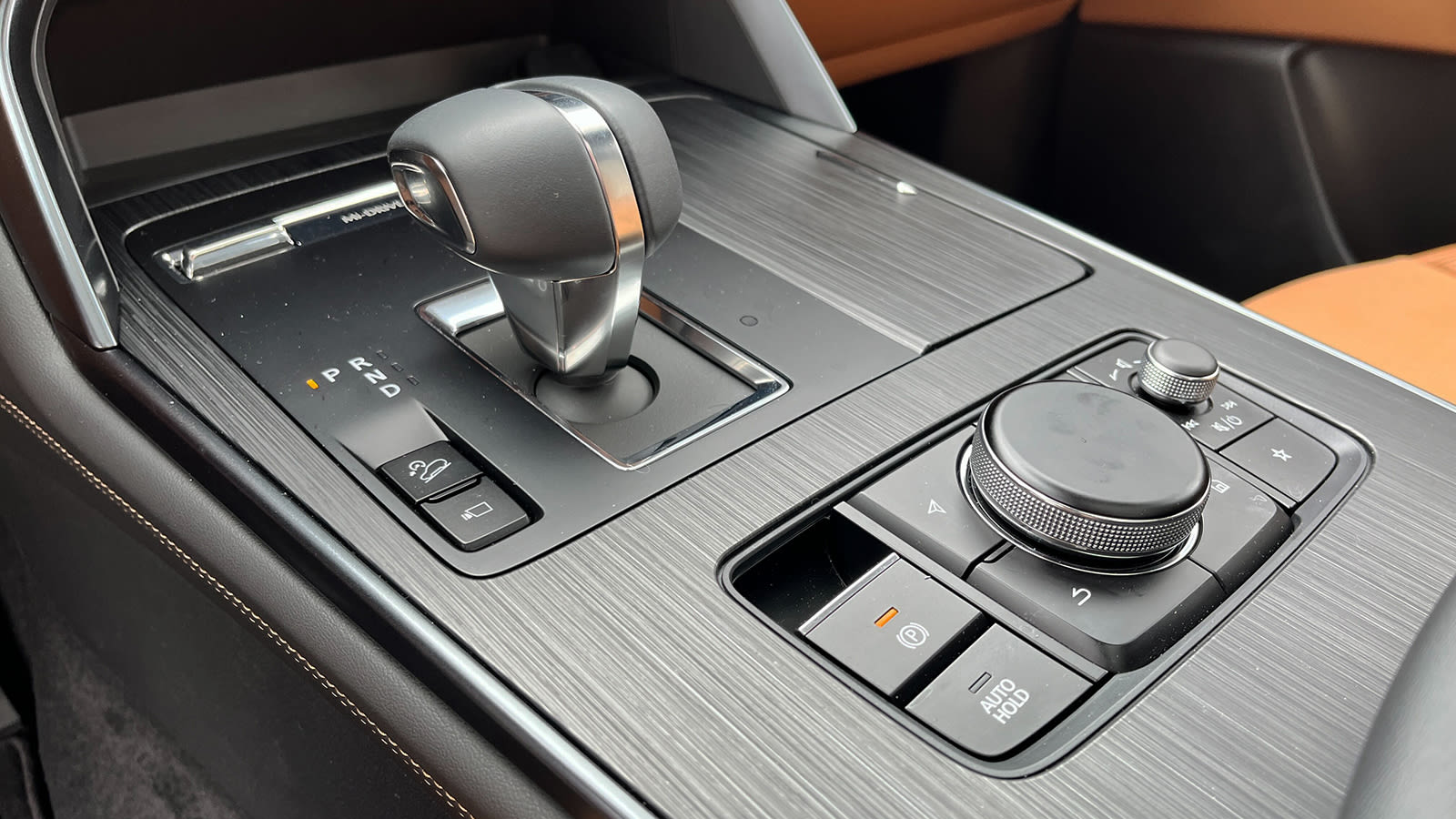
For as premium as this Mazda feels, the pricing is quite aggressive. The base Select trim starts at $40,970, which is a bit more than some other mainstream three-row SUVs like the Kia Telluride or Hyundai Palisade, but when factoring in the standard all-wheel drive, it’s extremely close. The PHEV starts at $48,820, a couple thousand less than Sorento PHEV and roughly $20,000 less than a Volvo XC90 Recharge. You can get a fully-loaded CX-90 PHEV for less than that base XC90 Recharge. The CX-90 Turbo S starts at $53,125, which is very competitive with three-rows from Acura, Infiniti and Lincoln.
With excellent driving dynamics, classy interiors, strong powertrains and good value, the CX-90 should be high on anyone’s shopping list, whether they’re looking at mainstream or upscale brands. It’s a strong competitor in a big field. But perhaps more importantly, it has great bones that Mazda will be able to rearrange for other products that should be just as good. We can’t wait to experience them. And with the next one, the smaller CX-70 just around the corner, we won’t have to wait long.
Related video:



